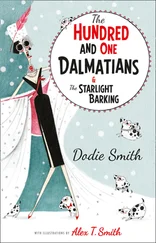Missis waited a few minutes, then crept out and pulled hay round Pongo to hide him. She no longer felt sleepy; she was far too anxious. Even her appetite had gone for the moment. Still, she knew she must find food for them both—and she had no idea how to, for she was almost sure there was no dog anywhere near to help her. But pretending to Pongo that she felt brave had made her really feel a little braver, and her tail was no longer down.
She could still see the thatched cottages, and she noticed some hens at the back of them. Perhaps the hens would have some stale crusts that she could—well, borrow. she went back.
The first cottage she reached was the one where the little boy lived. And now he was at the back, staring at her! This time, he had an even larger slab of bread and butter, with some jam on it. He ran towards her, holding it out.
“Perhaps he really means it now,” thought Missis. “Perhaps he’s sorry he hurt Pongo.” And she went forward hopefully—though well prepared to dodge stones.
The child waited until she was quite close. Then again he stooped for a stone. But he was on a patch of grass, with no stones handy. So, instead, he threw the slab of bread and butter. He threw it with rage, not love, but that made it no less valuable. Missis caught it neatly and bolted.
“Bless me,” she thought, “he’s just a small human who likes throwing things. His parents should buy him a ball.”
She took the bread and butter back to the haystack and laid it down by her sleeping husband’s nose. So far she had not even licked it, but now she let herself nibble off one very small corner. It tasted so glorious that her appetite came back with a rush, but she left all the rest for Pongo to find when he woke. Again she pulled the hay round him, and then ran to the road. But she saw a man outside the cottage where the little boy lived, so she did not dare to go back to visit the hens. She ran in the opposite direction.
It was now a very beautiful winter morning. Every blade of grass was silvered with hoarfrost and glittering in the newly risen sun. But Missis was far too worried to enjoy the beauty. The triumph of getting the bread was wearing off, and all sorts of fears were rushing at her.
Suppose Pongo was seriously injured? Suppose he was too lame to go on? Suppose she could find no food close at hand? If she had to go far, she knew she would get lost. She even got lost in Regent’s Park, almost every time the Dearlys were off the leash. They often laughed at the way she would stand still, wildly staring round for them.
Suppose she never found her way back to Pongo and he searched and searched and never found her? Lost dog! The very words were terrible!
And was she even now quite sure of her way back to the haystack?
“It isn’t fair,” thought Missis. “No one as worried as I am ought to feel hungry too.” For she was ravenous— and thirsty. She tried licking the ice in a ditch, but it hurt her tongue without quenching her thirst.
She was beginning to think she must go back and make sure where the haystack was, when she came to an old red-brick archway leading to a long gravel drive. Her spirits rose. Surely this must be the entrance to some big country house, such as she had stayed at several times when she and Mrs. Dearly were both bachelors. Such houses had many dogs, large kitchens, plenty of food. Joyfully she ran through the archway.
She could see no house ahead of her because the drive twisted. It was overgrown with weeds, and it went on so long that she began to wonder if it really did lead to a house. Indeed, it was now so wild and neglected that it seemed more like a path through a wood than the approach to a house. And it was so strangely silent; never in her life had Missis felt quite so alone.
More and more frightened, she ran round one more bend—and suddenly she was out in the open, with the house in front of her.
It was very old, built of mellow red brick, like the archway, with many little diamond-paned windows and one great window that reached almost to the roof. The windows twinkling in the early morning sunshine looked cheerful and welcoming, but there was no sign of life anywhere. And there was grass growing in the cracks of the wide stone steps which led to the massive oak door.
“It’s empty!” thought Missis in despair.
But it was not empty. Looking out of an open window was a Spaniel, black except for his muzzle, which was grey with age.
“Good morning,” he said most courteously. “Can I be of any help to you, my dear?”

It was wonderful how quickly the Spaniel took in the story Missis poured out to him, for he had not heard any news by way of the Twilight Barking.
“Haven’t listened to it for years,” he said. “Indeed, I doubt if I could get it now. There isn’t another dog for miles. Anyway, Sir Charles need me at twilight—he needs me almost all the time. I’m only off duty now because he’s in his bath.”

They were now in a large stone-floored kitchen, where the Spaniel had led Missis after inviting her to jump in through the window. He went on. “Breakfast before you tell me any more, young lady,” and led her to a large plate of meat.
“But it’s your breakfast,” said Missis, trying not to look as hungry as she felt.
“No, it isn’t. It’s my supper, if you really want to know. I’d no appetite—and I shan’t have any for breakfast, which will be served to me any minute. Tea’s my meal. Hurry up, my dear. It will be thrown away if you don’t eat it.”
Missis took one delicious gulp. Then she stopped. “My husband—”
The Spaniel interrupted her. “We’ll see about his breakfast later. Finish it all, my child.”
So Missis ate and ate and then had a long drink from a white pottery bowl. She had never seen a bowl like it.
“That’s an eighteenth-century dog’s drinking bowl,” said the Spaniel, “handed down from dog to dog in this family. And now, before you get too sleepy, you’d better bring your husband here.”
“Oh, yes!” said Missis eagerly. “Please tell me how to get back to the haystack.”
“Just go to the end of the drive and turn left.”
“I’m not very good at right and left,” said Missis, “especially left.”
The Spaniel smiled, then looked at her paws. “This will help you,” he said, “That paw with the pretty spot—that is your right paw.”
“Then which is my left paw?”
“Why, the other paw, of course.”
“Back or front?” asked Missis.
“Just forget your back paws.”
Missis was puzzled. Could she forget her back paws? And if she could, would it be safe?
The Spaniel went on. “Look at your front paws and remember: Right paw, spot. Left paw, no spot.”
Missis stared hard at her paws. “I will practise ,” she said earnestly. “But please tell me how to turn left.”
“Turn on the side of the paw which does not have a spot.”
“Whichever way I am going?”
“Certainly,” said the Spaniel. “The paw with the spot will always be your right paw. You can depend on that.”
“If I turned towards you now, would I be turning left?” asked Missis, after thinking very hard.
“Yes, yes. Splendid!” said the Spaniel.
Missis then turned round and faced the other way.
“But now you are on the side of the paw with the spot,” she said worriedly, “so my right paw has turned into my left.”
Читать дальше












